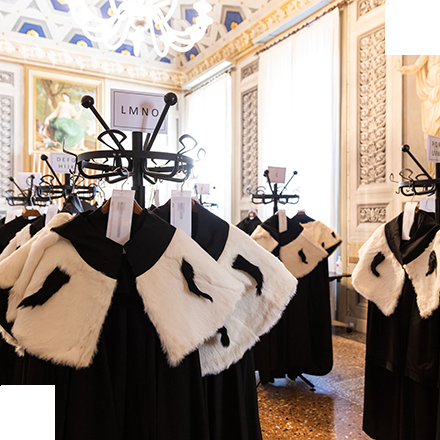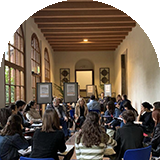Università Cattolica del Sacro Cuore Largo A. Gemelli, 1 - 20123 Milan
Roberto Vecchioni
Singer-songwriter and Professor
"If I met my former self, I would frankly dislike him. An uncertain boy, blocked by a total inability to have relationships, who traveled between absolute internalization and moments of giggling enthusiasm. A strong ego, but it's all played defensively."
Sitting in his sun-drenched house in the centre of Milan, while the cigar is almost completely consumed, Roberto Vecchioni gives a harsh assessment of the young man who, "a lifetime and a half ago", was studying Classical Literature at the Catholic University. The Professor investigates himself, rummages through his memories, and explains that "probably this strange character influenced the choice of studies, and the passions of those years. I was in love with ancient letters, in the authors I studied I found the strong themes that interested my life, but I also did it to distinguish myself from the mass of my peers."
When did you attend Cattolica? What was the climate like?
It was the sixties, the protest had not yet begun, the boys of my age were wasting their time in stupid things, and in the Milanese bourgeoisie they thought only of their father's job to take his place. A heavy atmosphere that also reigned at the University. In this environment it was difficult to build real friendships, especially for someone like me, because my fellow students were very focused on subjects, deadlines, exam sessions, and it was almost impossible to talk about anything else with them. Of all those people, I don't know anyone anymore.
In those years, the protest movement began in Cattolica: how did you experience it?
I saw the student movement from the outside, because I graduated in 1968, with a thesis on the fourth book of the Corpus Tibullianum discussed with Professor Benedetto Riposati. As soon as I finished my studies, perhaps as a reaction, I joined the Communist Youth Federation, which for the protesters of the time meant being a reactionary. For two years, after graduating, I was an assistant professor of History of Religions. I also worked for the school union, because I was starting to teach at the time, and I got to know Mario Capanna. We saw each other again thirty years later, and we both changed a lot.
What does politics mean to you?
It was an expression of my personality, I lived it in a total way, almost with the enthusiasm to throw out all the participation I was capable of. I wanted to take charge of all the problems in the world, I passionately followed everything that happened and I even felt bad about it, and this all-encompassing attitude responded to a deep and personal need. Over the years, then, came maturity and I learned that momentum must also be managed, measured.
You said earlier that you didn't recognize yourself in Vecchioni as a student. Who or what changed it?
It's hard to say. Certainly, the failure of my first marriage changed me a lot, and then the birth of my children allowed me to pour out on them the affection and feelings that I had previously lived only in a selfish way. The '80s were a slow process of reconstruction, in which the presence of my current wife was fundamental, who on three or four occasions really saved my life. However, I have the impression that I have a staggered existence.
In what sense?
In the sense that almost everything happened to me "late" compared to the others: I graduated late, I had my first love late, I left home at thirty, and only at fifty, so to speak, did I realign myself, and there a new way of being was born. It was more or less the same with the songs. I started writing them when I was only 17 years old, but it took me eleven years to be able to perform on stage. For someone like me, after all, the song is a formidable way to reveal oneself by hiding; For a declaration of love, for example, you can say even very daring things, but you always have an escape route because you hide behind the scenic fiction of the song.
Young people and music
A fundamental relationship. In 1999 I was a speaker at a series of cultural and musical meetings on songwriting in various French universities. From 1999 to 2000 I promoted 40 appointments with Italian high schools and universities, meeting over 50 thousand students on the theme "Music and poetry", talking about the historical evolution of songwriting.
What are you working on now?
I am preparing a new album that will be entitled The Old Man and the Sea, but it is a difficult and painful work, both for my health conditions and for the fact that I have lost many of the stimuli and impulses of imagination that are fundamental in any art, even in a small art like mine. As in any new work, I have the hope of saying something new and surpassing myself, even if I don't have much faith in music critics. I recognize that critics have always been kind and helpful to me, but I have the impression that I have not yet been read in depth, and that there has not yet been a universalizing analysis of my work that satisfies me.
When did you start writing books?
The books come much later, and they are born out of pressure from the publishing house. It was a work that involved and excited me a lot, because the dimension of the book opens the field to a series of reflections and reasoning that do not find space in a song, made almost exclusively of feelings. They are both very classic books, especially the volume of short stories, in which I take the life of a historical figure and grasp it in an apparently secondary aspect, but which in my opinion already says everything about him.
A particular satisfaction?
The entry "Canzone d'autore" that Treccani asked me to edit for the appendix 2000 of the great encyclopedia.
So, do studies and culture also come into play in this?
Above all, Greek texts and culture, which I have taken as a logical and emotional rule for my life. I especially loved tragedy, which was the master of all the arts and is still the matrix of all behaviors, but it is Greek civilization as a whole, with its sense of universal belonging, that shaped the West. The Greeks, in essence, in the six hundred years of their history have written the history of the world, because they lived through the initial momentum, the monarchical period, the construction of democracy and finally the decadence, which came when there was no more substance to feed that world, which was consequently overwhelmed by the military strength of the Romans. If our school, out of a misunderstood sense of modernity, decided not to teach these things anymore, our civilization would be halved, because it would have lost touch with its origins.
"The song is a way to reveal myself secretly:
I can say bold words of love behind a fictional stage story."






